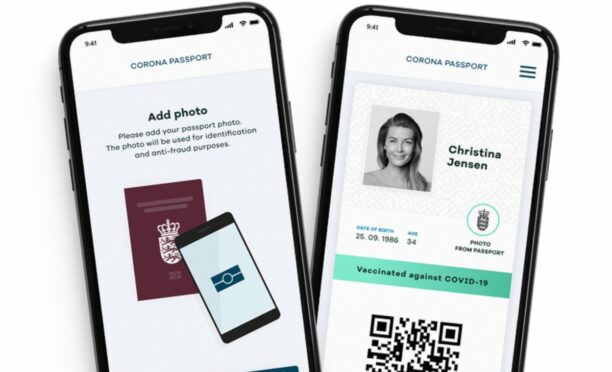
The NHS has yet to decide how Scotland’s new vaccination passport system should work weeks before it is meant to launch, according to the Danish tech firm building it.
First Minister Nicola Sturgeon last week announced plans to force people to prove their vaccination status for entry to nightclubs and some events. If MSPs back the plan it will be introduced later this month.
Scots have been able to download a QR code showing their vaccination status from last Friday but it has not been revealed how the system will work or who will be responsible for checking vaccination passports.
The contract
The Scottish Government has awarded a £600,000 contract to a Danish firm, Netcompany, to develop a system similar to those used in Europe. It is possible this would be similar to Netcompany’s existing Danish mobile phone app, which confirms your vaccination status. It also requires a passport photograph, unique medical ID and pin code.
The FM said the system will be in place later this month but Netcompany said the NHS has still to give them final specifications.
The firm said: “We have the task to develop the solution that was communicated (by the Scottish Government). I’m not able to say it will be a solution similar to what we have in Denmark. Those decisions and the scope of the solution is something NHS Scotland has to make up their mind on.”
The rules will initially apply to nightclubs and adult entertainment venues, unseated indoor live events with more than 500 people in the audience, unseated outdoor live events with more than 4,000 people in the audience and any event that has more than 10,000 people in attendance.
The decision on whether to extend the scheme to all hospitality businesses, such as pubs and restaurants, at a later date is to be kept under review, Sturgeon has said.
In England people can show their vaccination status with the NHS Covid Pass, which is available in an app. UK Government ministers will make it law by the end of September to require the Covid Pass to be used to access higher-risk settings in England, including nightclubs.
Concerns
Scottish Lib Dem leader Alex Cole-Hamilton, whose party is against the use of vaccination certificates, said: “The fact the normal practice could be to include your photo with your health data seems they may be even more like the medical ID cards we fear them to be.
“The Scottish Liberal Democrats believe you should never have to share your private medical data with strangers who are not clinicians to gain access to venues or services.”
The Scottish Greens are likely to back Sturgeon’s plan in a parliamentary vote expected to be held on Thursday although Green MSP Maggie Chapman has misgivings. She said: “I am concerned that vaccine certification runs the risk of further marginalising already marginalised people. What precedent for sharing other health information do we set?”
Scottish Labour leader Anas Sarwar also opposes the plan. He said: “Research suggests that vaccine passports could actually be more likely to increase or entrench vaccine hesitancy among harder-to-reach groups. And there is a real risk that vaccine certification could lead to a false sense of security among people who can still transmit the virus.”
That view has been backed by professor of behavioural psychology Stephen Reicher, an adviser to the Scottish Government.
He said: “Passports are a risky strategy and it is unwise to make them your primary route of protection.”
Deputy First Minister John Swinney told a Holyrood committee last week vaccination passports to access some settings would incentivise young people to get two doses. He had previously criticised such a system as “the wrong way to go”.
The Scottish Government said: “The app will require people to verify their identity and full details set out in due course.”

Enjoy the convenience of having The Sunday Post delivered as a digital ePaper straight to your smartphone, tablet or computer.
Subscribe for only £5.49 a month and enjoy all the benefits of the printed paper as a digital replica.
Subscribe